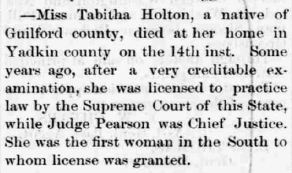We have gotten past the elections now, if not their consequences. So this may be a good time for me to say that I believe judges should be selected on the basis of merit and competence rather than elected, reflecting membership in a political party or adherence to a political ideology.

Albion Tourgee
The vast preponderance of decisions that judges make – about contracts, torts, crimes, etc. – have nothing at all to do with politics. Justice flows from judges who are independent, unbiased, able and wise – and appear to be so.
I like seeing judges come from all quarters and without labels. And, on the other hand, I am able to identify idiots in every political party. (In fact, this is a talent of mine, and I can do it on very short notice.)
Several years ago, I visited my thoughts about this on the Greensboro Bar Association, in the context of 19th Century Greensboro lawyer and judge Albion Winegar Tourgée and the judicial partisanship in his day. What I said follows, changed only a little.
Judge Tourgée, was the carpetbagger, radical and crusader for racial justice who moved to Greensboro immediately after the Civil War. Ultimately, Greensboro citizens ostracized, threatened and drove him from town. For a time though, Tourgée, the Republican Party and their allies enjoyed political sway here, and during that period Tourgée was elected to the bench.
Judge Tourgée was roundly despised by his political opponents. In the extremely partisan election campaign for his seat, one newspaper characterized Tourgée as “a shallow-brained revengeful yankee.” Another opined that he was “the meanest looking man it has ever been our misfortune to meet.” Not content with that general observation, it went on to say
The pirate; the cutthroat; the despicable, mean, cowardly, crawling, sneaking villain have been portrayed by nature … in every lineament of his countenance. The mark of infamy is stamped indelibly on his brow in the shape of a large protuberance that strikes the beholder with ineffable disgust.
Still others saw in him “a cannibal, a gorilla, the wandering Jew, a Ku Klux or Anti-Christ” and charged (falsely) that he had served time in a penitentiary.
And yet, he was elected to the bench.
Tourgée’s opponents did not desist in their opposition to him after the election. To the contrary, a plot was hatched to assassinate him in his Guilford County courtroom as he presided over criminal proceedings against members of the KKK. The plot was not consummated, but surely a planned assassination betokens an extreme of partisanship.
Despite all the invective, even Tourgée’s opponents at the bar credited him as an able, fair and, most amazingly of all, an impartial judge.
Interestingly, in Tourgée’s time politicians divided up along generally the same lines as they do today; except, in Tourgée’s time it was the Republicans and their Whiggish allies who advocated for an activist government, loose interpretation of the Constitution and levying taxes as needed to support their activist program. Democrats on the other hand, decried government participation in commerce, supported strict constructionism and abominated taxes.
Clearly, deeper wisdom has since come to both parties and they have re-wrought their ideologies accordingly. But it makes you wonder about the merits of partisanship as a guide to enduring truth.
Now, I am not suggesting that partisan judicial elections lead to assassination plots or pirates on the bench. But … that is exactly what did happen once upon a time in old Guilford County.
Just saying . . .



 MidLaw spoke to the East Greensboro Rotary Club this morning. They convene at 7:30 AM in Jones Hall on the campus of Bennett College (they have one handsome dining hall in there but they do gather at an early hour).
MidLaw spoke to the East Greensboro Rotary Club this morning. They convene at 7:30 AM in Jones Hall on the campus of Bennett College (they have one handsome dining hall in there but they do gather at an early hour). We are at a cultural moment.
We are at a cultural moment.